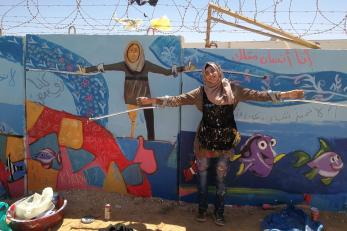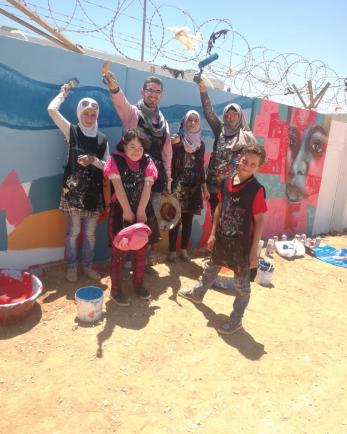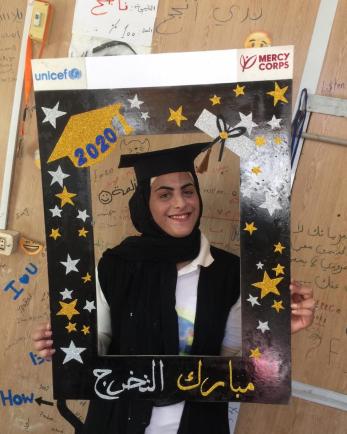An inclusive education success story

Eman, 18 years old, fled from Syria to Jordan with her mother, sister and brother in 2013 due to the war that had erupted in their home-country. Her family fled from Dara’a and found refuge in Zaatari Camp. Eman suffered from war injuries and her right leg was amputated below the knee.
Her mother and brother returned to Syria, but Eman remained in Jordan with her sister to continue her therapy. From that point on Eman and her sister, 12 and 25 years old respectively, were living on their own.
Eman was rendered with a permanent physical disability, and needed an artificial limb to walk. Her injury set her back for one entire academic year. She had difficulty walking using the artificial limb at first which was further exacerbated by the Zaatari terrain. This caused school accessibility problems and at times a lack of desire to go to school.
Eman, however, never lost hope. She enrolled in school, and Mercy Corps started assisting her. She received physical therapy in an attempt to improve use and functionality of her newly acquired artificial limb.

Eman was able to return to school in November 2013 with support, joining Mercy Corps’ Inclusive Education Program, and enrolling in the extracurricular program. To further encourage Eman to attend school, her sister became part of the staff who assisted transportation of students, including Eman, and was financially compensated to do so.
“At Mercy Corps, there were extracurricular activities, including handcrafts courses, which I particularly adore. I grew immensely in drawing, after which I participated in several initiatives where we drew on classroom walls and on the main gates of the school. For me, drawing offered a fabulous psychological remedy,” Eman said.
During her Tawjihi studies, she covered part of the additional studying costs, such as books and additional internet connectivity, through income she generated selling portraits and drawing. Especially during the lockdown, where learning turned into remote mode.
“I was investing my skills in drawing to express my story, so most of the drawings were expressing my reality,” Eman said.

This year, Eman passed Secondary Education year “Tawjihi,” and she is dreaming of enrolling in a university with a dream to become a global translator. She plans to promote the issues of refugees and people with disabilities to the whole world.